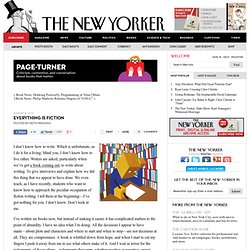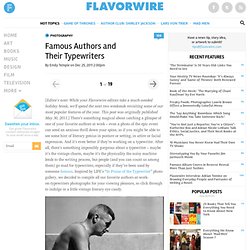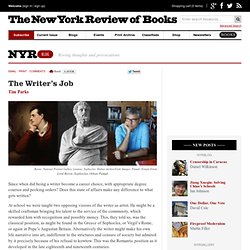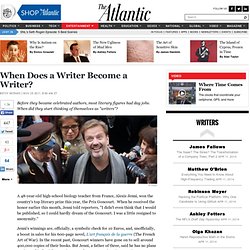

12 Famous Writers on Literary Rejection. 15 Postcards from Famous Authors. Everything in Writing and Life is Fiction. I don’t know how to write.

Which is unfortunate, as I do it for a living. Mind you, I don’t know how to live either. Writers are asked, particularly when we’ve got a book coming out, to write about writing. To give interviews and explain how we did this thing that we appear to have done. We even teach, as I have recently, students who want to know how to approach the peculiar occupation of fiction writing. I’ve written six books now, but instead of making it easier, it has complicated matters to the point of absurdity. Something, obviously, is going on. I do no research. And I mean that—everything is fiction. So I love hearing from people who have no time for fiction. Related: Read Keith Ridgway’s interview with Cressida Leyshon about his short story “Goo Book,” which appeared in the April 11, 2011, issue of the magazine. Illustration by Richard McGuire. Famous Authors and Their Typewriters.
[Editor's note: While your Flavorwire editors take a much-needed holiday break, we'll spend the next two weekends revisiting some of our most popular features of the year.

This post was originally published May 30, 2011.] There’s something magical about catching a glimpse of one of your favorite authors at work – even a photo of the epic event can send an anxious thrill down your spine, as if you might be able to see some hint of literary genius in posture or setting, in attire or facial expression. And it’s even better if they’re working on a typewriter. After all, there’s something impossibly gorgeous about a typewriter – maybe it’s the vintage charm, maybe it’s the physicality the noisy machine lends to the writing process, but people (and you can count us among them) go mad for typewriters, especially if they’ve been used by someone famous. Dave Astor: The Surprising Non-Literary Jobs of Some Authors. It's no shock when novelists work as journalists or professors before, during, or after their book-producing years.

But some famous writers have held rather unusual non-literary jobs. On the positive side, these stints of atypical-for-authors employment might inspire future books and/or give writers firsthand knowledge of the way non-writers live. On the negative side, these need-the-money jobs can take away from precious prose-creating time. My job is to now give examples of this multi-profession phenomenon, and I'll start in the 19th century with the career story lines of a famous American literary trio: Mark Twain, Herman Melville, and Nathaniel Hawthorne.
Twain, from 1857 to 1861, worked as a riverboat pilot -- a Mississippi life that not only inspired the factual Life on the Mississippi but also the fictional Adventures of Huckleberry Finn. Hawthorne fared much better with atypical-for-authors employment. Then there was the author who inspired this post. Elif Shafak: The politics of fiction. The Writer’s Job by Tim Parks. Since when did being a writer become a career choice, with appropriate degree courses and pecking orders?

Does this state of affairs make any difference to what gets written? At school we were taught two opposing visions of the writer as artist. He might be a skilled craftsman bringing his talent to the service of the community, which rewarded him with recognition and possibly money. This, they told us, was the classical position, as might be found in the Greece of Sophocles, or Virgil’s Rome, or again in Pope’s Augustan Britain. Alternatively the writer might make his own life narrative into art, indifferent to the strictures and censure of society but admired by it precisely because of his refusal to kowtow. As we know, T.S. Still, none of this prepared us for the advent of creative writing as a “career.” Let’s consider a few of the changes that led us to this state of affairs. In the twentieth century people stopped just reading novels and poems and started studying them. When Does a Writer Become a Writer? - Betsy Morais - Entertainment.
Before they became celebrated authors, most literary figures had day jobs.

When did they start thinking of themselves as "writers"? AP Images A 48-year-old high-school biology teacher from France, Alexis Jenni, won the country's top literary prize this year, the Prix Goncourt. When he received the honor earlier this month, Jenni told reporters, "I didn't even think that I would be published, so I could hardly dream of the Goncourt. I was a little resigned to anonymity. " Jenni's winnings are, officially, a symbolic check for 10 Euros, and, unofficially, a boost in sales for his 600-page novel, L'art français de la guerre (The French Art of War). The astounding honor that plucked Jenni from his humble weekend scribbling to rank him among the French literary elite—past Goncourt winners include Marcel Proust, Marguerite Duras, Simone de Beauvoir, and Georges Duhamel—is the rare acknowledgement of a former "nobody" as a "somebody. " T.S. Why Many Writers Get Little Support From Friends and Family.